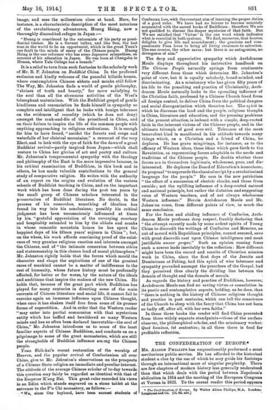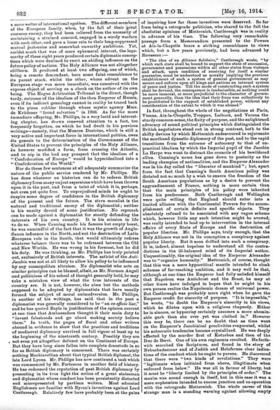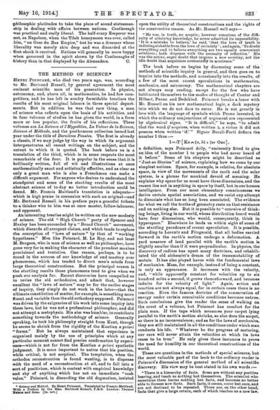THE CONFEDERATION OF EUROPE..
Anises PHILLIPS has unquestionably performed a most meritorious public service. He has afforded to the historical student a clue by the use of which he may guide his footsteps through an international maze of singular perplexity. There are few chapters of modern history leas generally understood than that which deals with the period between Napoleon's abdication in 1814 and the meeting of the European Congress at Verona in 11382. To the casual reader this period appears • The Confedsratios of %irons. By Walter Alison Phillip., M,A., Loudon: 1,0akrasaaa and Co. 1.7. ed. net.]
mere welfer of international egotism. The different members of the European family, when, by the fall of their great common enemy, they bad been relieved from the necessity of maintaining a strained concord, engaged in a wordy warfare with each other, and gave a loose rein to their long-suppressed mutual jealousies and somewhat unworthy ambitions. Yet, amidst much that was of mere ephemeral interest, the logo- tnachy of these eight years produced certain diplomatic concep- tious which were destined to exert an abiding influence on the tuture policy of nations. The Holy Alliance was not altogether stillborn. It produced at least two offspring, one of which, being a remote descendant, bore some faint resemblance to its parent stock, whilst the other, whose advent on the European stage was more immediate, was conceived with the express object of serving as a check on the author of its own being. The Hague Arbitration Tribunal is the direct, though tardy, outcome of the idealism of the then Emperor of Russia, even if its indirect genealogy cannot in reality be traced back to the pious cobbler through whose mystic agency Mme. de Kriidener "found salvation" in 1806. As for the more immediate offspring, Mr. Phillips, in a very lucid and interest- ing chapter, has drawn renewed attention to a fact, too frequently forgotten, on which he had dwelt in his previous writings—namely, that the Monroe Doctrine, which is still a very active and important force in international politics, owes its genesis to the determination of the Government of the United States to prevent the principles of the Holy Alliance, in however modified a form, from crossing the Atlantic, and to nip in the bud any prospect that the idealism of a " Confederation of Europe" would be hyperidealized into a Confederation of the World."
Nor do these few sentences at all adequately summarize the nature of the public service rendered by Mr. Phillips. He has done whatever an historian can do to redeem British diplomacy from many unjust aspersions which have been thrown upon it in the past, and from a taint of which it is, perhaps, not even yet quite free. To unprejudiced minds he ought to .inspire some degree of confidence in the British diplomacy -of the present and the future. The stern moralist is the .natural and traditional enemy of the diplomatist ; neither is his enmity devoid of some justification. No reproach can be made against a diplomatist for stoutly defending the 'interests of his own country. It is his mission in life to do so. When Canning made his famous but empty boast, die was unmindful of the fact that it was the growth of Anglo- Saxon influence in the North, and not the destruction of Latin European rule in the South, that would ultimately redress whatever balance there was to be redressed between the Old and New Worlds. He was wrong in his forecast, but he did his duty. He was thinking, as Mr. Phillips has truly pointed out, exclusively of British interests. The satirist of the Anti- Jacobin was not at all likely to allow his policy to be influenced -by any cosmopolitan altruism. No diplomatist who acts on similar principles can be blamed, albeit, as Mr. Norman Angell and politicians of his school of thought generally hold, he may take a mistaken view of what the true interests of the country are. It is not, however, the aims but the methods supposed to be adopted by diplomatists that have usually formed the subject of moral animadversion. Mr. Phillips, in another of his writings, has said that in the past a diplomatist was generally considered to be "an ex-officio liar," and he has quoted Bayle in justification of the opinion current at one time that Ambassadors thought it their main duty to "invent falsehoods and go about making society believe them." In truth, the pages of Sorel and other writers abound in evidence to show that the practices and traditions of mediaeval diplomacy survived in full vigour at least up to the beginning of the nineteenth century. Possibly they are , not even yet altogether defunct on the Continent of Europe. But they have long since fallen into complete desuetude in so far as British diplomacy is concerned. There was certainly nothing Machiavellian about that typical British diplomat, the late Lord Lyons. Mr. Phillips has now continued a task which was commenced by Mr. Fortescue in another field of history. He has redeemed the reputation of past British diplomacy by presenting in its true light the action of a great statesman and diplomatist whose conduct has been persistently distorted and misrepresented by partisan writers. Most educated Englishmen are familiar with Byron's invectives against Lord Castlereagh. Relatively few have probably been at the pains of inquiring how far those invectives were deserved. So far from being a retrograde politician, who shared to the full the absolutist opinions of Metternich, Castlereagh was in reality in advance of his time. The following very remarkable passage from a Memorandum presented to the Powers at Aix-la-Chapelle bears a striking resemblance to views which, but a few years previously, had been advanced by Rousseau :— "The idea of an Alliance Soliclaire," Castlereagh wrote, "by which each state shall be bound to support the state of succession, government and possessions within all other states from violence and attack, upon condition of receiving for itself a similar guarantee, must be understood as morally implying the previous establishment of such a system of general government as may secure and enforce upon all kings and nations an internal system of peace and justice. Till the mode of constructing such a system shall be devised, the consequence is inadmissible, as nothing could be more immoral, or more prejudicial to the character of govern. merit generally, than the idea that their force was collectively to be prostituted to the support of established power, without any consideration of the extent to which it was abused."
In fact, throughout the whole of the negotiations at Paris, Vienna, Troppau, Laibach, and Verona the sturdy common-sense, the fixity of purpose, and the enlightened advocacy of sound political principles which distinguished the British negotiators stand out in strong contrast, both to the shifty devices by which Metternich endeavoured to rejuvenate the moribund dynastic diplomacy of the past, and to the rapid transitions from the extreme of autocracy to that of un- practical idealism by which the Imperial pupil of the Jacobin La Harpe was wont to distract the councils of his bewildered allies. Canning's name has gone down to posterity as the leading champion of nationalities, and the Emperor Alexander was in his day called the "liberator of mankind"; but, apart from the fact that Canning's South American policy was dictated not so much by a wish to ensure the freedom of the South American populations as by a desire to prevent the aggrandisement of France, nothing is more certain than that the main principles of his policy were inherited from his predecessor. Both Castlereagh and Wellington were quite willing that England should enter into a limited alliance with the Continental Powers for the accom- plishment of certain definite and specific objects. They absolutely refused to be associated with any vague scheme which, however little any such intention might be avowed, was really intended to lead up to intervention in the internal affairs of every State of Europe and the destruction of popular liberties. Mr. Phillips says, truly enough, that the Holy Alliance was not in its conception a conspiracy against popular liberty. But it soon drifted into such a conspiracy. It is, indeed, almost hopeless to understand all the contra- dictions in the ill-balanced mind of its Imperial author. Unquestionably, the original idea of the Emperor Alexander was to "organize humanity." Metternich, of course, thought that this was a mere hypocritical mantle intended to cloak schemes of far-reaching ambition, and it may well be that, although at one time the Emperor had fully satisfied himself that Napoleon was Antichrist and the Beast, be may at other times have indulged in hopes that he might in his own person realize the Napoleonic dream of universal power. But Castlereagh was probably more right when he gave the Emperor credit for sincerity of purpose. "It is impossible," he wrote, "to doubt the Emperor's sincerity in his views, which he dilates upon with a religious rhapsody. Either he is sincere, or hypocrisy certainly assumes a more abomin- able garb than she ever yet was clothed in." However this may be, there can be no doubt that as time went on the Emperor's Jscobinical proclivities evaporated, whilst his autocratic tendencies became crystallized. He was deeply affected by the murder first of Kotzebue and then of the Due de Berri. One of his own regiments revolted. He forth- with searched the Scriptures, and found in the story of Nebuchadnezzar and of Judith and Holofernes clear indica- tions of the conduct which he ought to pursue. He discovered that there were "two kinds of revolutions." They were "legitimate when initiated from above, illegitimate when enforced from below." He was all in favour of liberty, but it must be "liberty limited by the principles of order." The maxim was sound enough in itself, but in this case it was a mere euphemism intended to excuse junction and co-operation with the retrograde Metternich. The whole career of this strange man is a standing warning against allowing empty
sphilosophic platitudes to take the place of sound statesman. ship in dealing with affairs between nations. Castlereagh was practical and really liberal. The half-crazy Emperor was sot, as Napoleon, when the Tilsit honeymoon was over, called bite, "on Grec dti Bas Empire," but he was a dreamer whose liberality was merely skin deep and was discarded at the 'first shock it received. Nations will generally be more happy when governed in the spirit shown by the Castlereagha of iistory than in that displayed by the Alexanders. C.












































 Previous page
Previous page